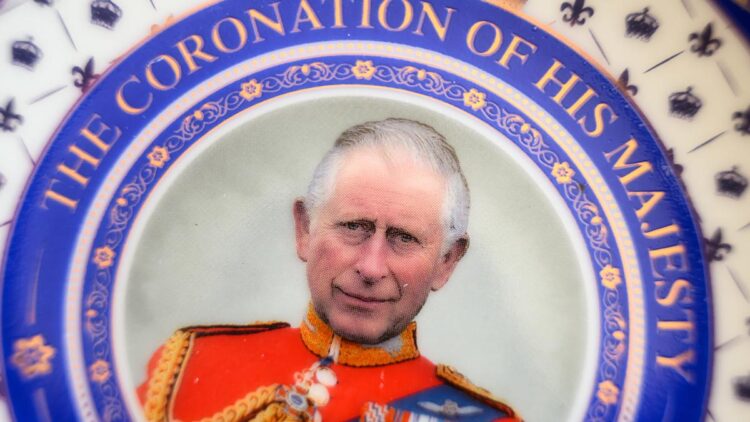King Charles III may be set to lose yet another sovereign state under his rule – New Zealand – as Prime Minister Chris Hipkins said on May 1 that he favours his country becoming a republic. He, however, added that he does not intend for change right away.
Hours before leaving for London to attend King Charles III’s coronation, Mr. Hipkins told reporters, “Ideally, in time, New Zealand will become a fully independent country, will stand on our own two feet in the world, as we, by and large, do now”.
“I don’t think that swapping out the governor-general for some other form of head of state is necessarily an urgent priority right now, though,” he added.
New Zealand is a self-governing former British colony. However, Charles retains a largely ceremonial role as head of state and king and is represented in New Zealand by a governor-general. Like other former colonies, the debate over the constitutional role of the British monarchy in modern times is rife in New Zealand.
Apart from New Zealand, King Charles III is the monarch and head of state for fourteen sovereign countries, collectively known as the Commonwealth realms — Antigua and Barbuda, Australia, the Bahamas, Belize, Canada, Grenada, Jamaica, New Zealand, Papua New Guinea, Saint Kitts and Nevis, Saint Lucia, Saint Vincent and the Grenadines, the Solomon Islands, Tuvalu and the United Kingdom (UK).
In 2021, Barbados removed the then-Queen Elizabeth II as its head of state, becoming the newest republic in the world. It was the first to cut ties from the British monarchy since 1992, when Mauritius became a republic.
Follow the coronation updates here: King Charles III’s coronation ceremony live updates | King’s procession arrives at Westminster Abbey
What power does the King have over these nations?
As head of state, the King is represented by a Governor-General in these countries. In the name of the monarch, the Governor-General opens and dissolves parliament, commissions the Prime Minister, appoints other ministers after elections, gives assent to laws passed by Parliament and performs ceremonial duties as Commander-in-Chief of Armed Forces, such as attending parades.
File photo: Britain’s Queen Elizabeth II poses for a group photograph with Commonwealth leaders in Port-of-Spain, Trinidad, on November 27, 2009
| Photo Credit:
ANDRES LEIGHTON
Here’s a look at the current Commonwealth realms & their relationship with the Crown:
Antigua and Barbuda
Situated in the West Indies, at the juncture of the Atlantic Ocean and the Caribbean Sea, Antigua was colonized by the British in 1632 while Barbuda was colonized in 1678, primarily for slavery. The islands were decolonized in 1956 and joined the West Indies Federation. Antigua became self-governing in 1967, remaining dependent on the UK for external affairs and defence.
Amid calls for Independence in the 1970s in Antigua, Barbuda demanded secession from the larger island, voicing concerns about a stifled economy. However, autonomy talks were successful, and Antigua and Barbuda achieved independence on November 1, 1981. Shortly after, the country officially joined the United Nations and the Commonwealth —retaining the British monarch as its head of state.
On September 22, 2022, Reuters reported that the nation plans to hold a referendum about becoming a republic within the next three years. Following the death of Queen Elizabeth II, the country confirmed Charles III as its King, but Prime Minister Gaston Browne expressed a wish to ‘complete the circle of independence’ and become a republic.
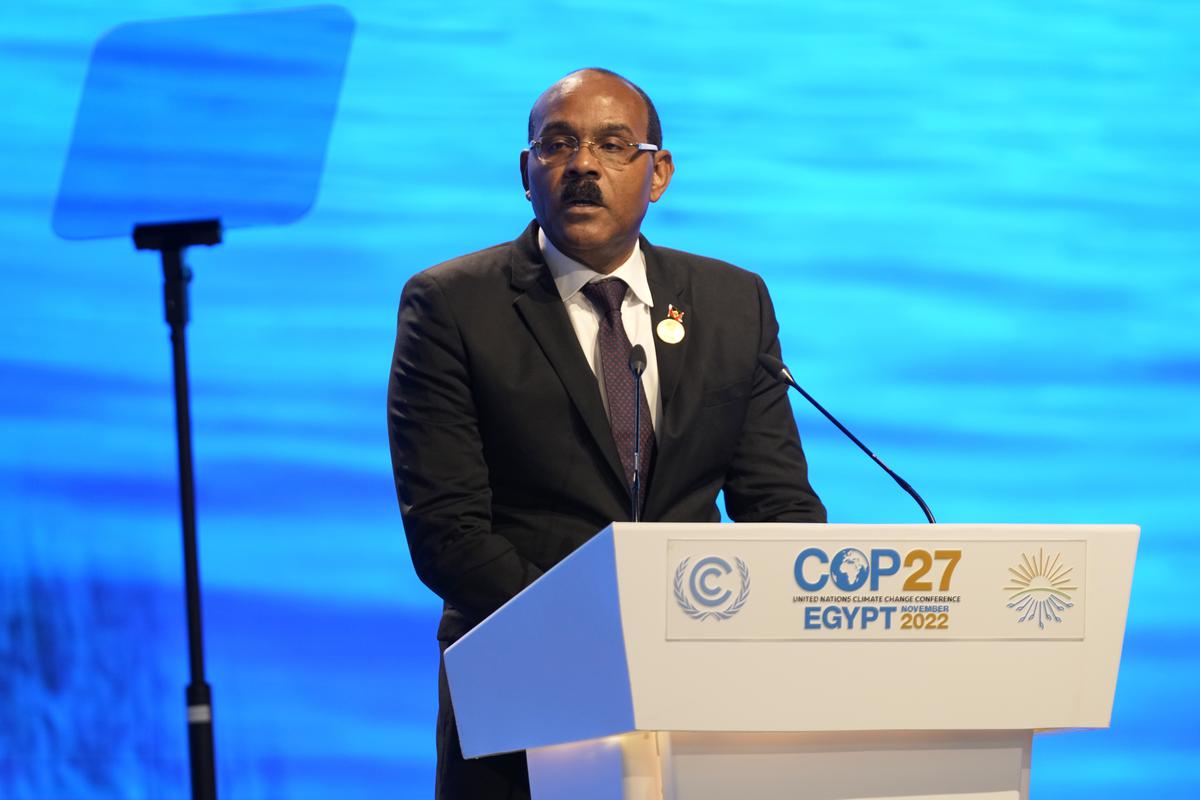
File photo: Gaston Browne, prime minister of Antigua and Barbuda, speaks at the COP27 U.N. Climate Summit, on November 8, 2022, in Sharm el-Sheikh, Egypt.
| Photo Credit:
Peter Dejong
Australia, New Zealand & Papua New Guinea
The first British settlers arrived in Australia in 1788, establishing a penal colony in a land hitherto inhabited by over 500 aboriginal groups.
Strengthed by the arrival of the British Navy, the settlers waged several wars against the indigenous Maori population, eventually colonizing Australia, Tasmania, Papua New Guinea and New Zealand, which lost nearly 60% of their native inhabitants. As the settlers’ population grew, Australia was split into six colonies—over 80% white.
In 1901, Australia became a federation and the British monarch became the titular head of the state. Amid calls to become a republic, Australia held a referendum in 1999, which failed.
Recently, the Reserve Bank of Australia announced that King Charles III will not feature on Australia’s new five dollar note, opting to pay tribute to Indigenous Australians. While there are no urgent calls to alter the monarchy’s role, the government hopes to push for a referendum by 2025 if current Prime Minister Anthony Albanese wins a second term.
Similarly, New Zealand’s ex-Prime Minister Jacinda Ardern said that while the country would not actively push to become a republic, it eventually would. A New Zealand lobby group called Republic has set a goal of 2040 for a transition, hoping Australia’s referendum could speed up New Zealand’s process.
Australia and New Zealand’s neighbour, Papua New Guinea, too was colonised by the British in the 1880s following gold finds. Later, the island, dubbed New Guinea, was handed over to the Australian federation in 1906. Rich in cacao and Arabica coffee plantations, New Guinea remained under Australian administration till 1975. There have not been any strong calls for the removal of the King as titular head.
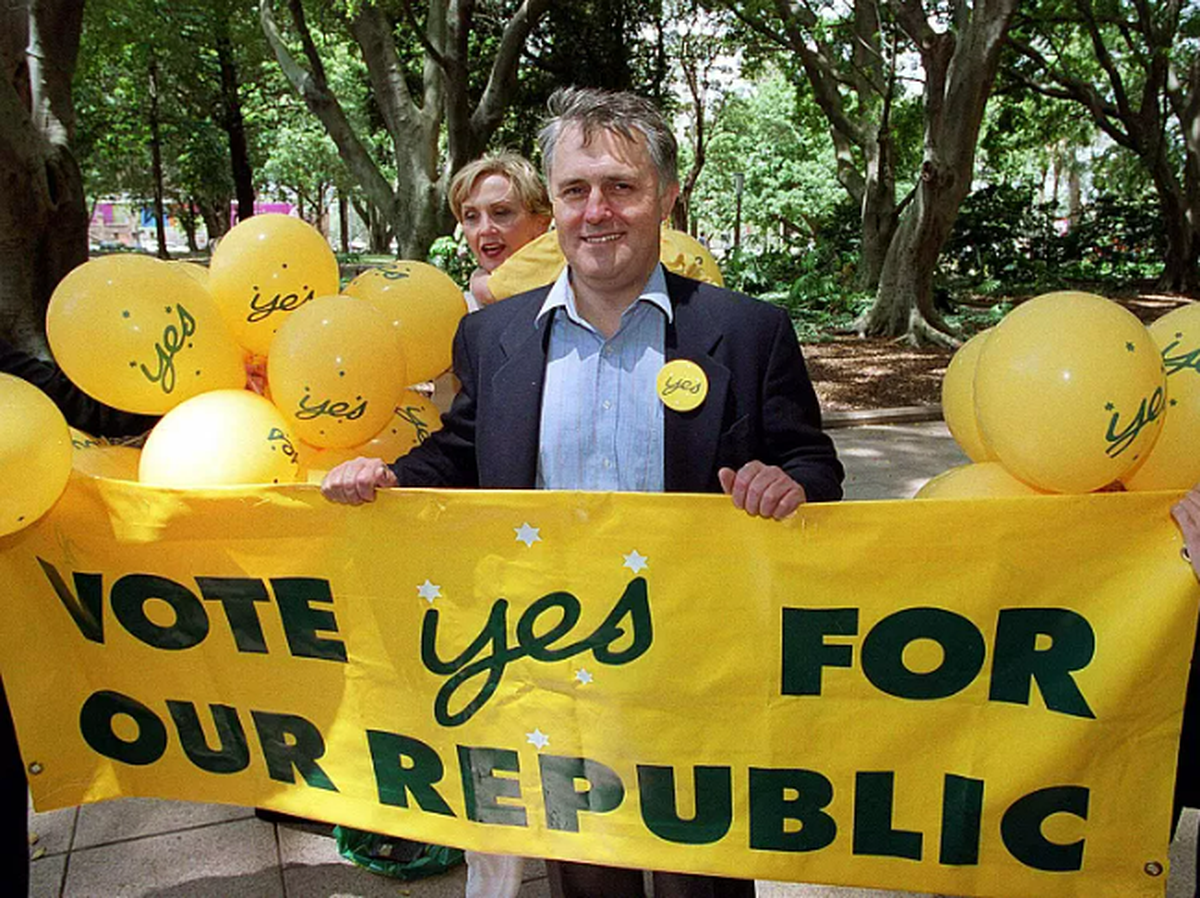
File photo: Then Australian Republican Movement chief Malcolm Turnbull during a referendum vote on becoming a republic in 1999.
| Photo Credit:
Rob Griffith
The Solomon Islands
Comprising six major countries and 900 smaller islands, the Solomon Islands are situated east of Papua New Guinea. These islands were exploited by the German and British armies for slave labour for plantations in Fiji and Queensland, Australia. By 1899, the Solomon Islands were under British rule and remained so till its independence on July 7, 1978. The debate for removing the Crown as its head has arisen post the death of Queen Elizabeth II.
The Bahamas
Another island in West Indies, the Bahamas was colonized by the British in 1666, with a plantation colony set up comprising the native Lucayans. However, the settlers soon lost interest in developing the islands and they turned into a pirate haven. In 1718, British troops were sent to tackle the pirate menace, and the island was captured by the US Navy in 1783, prompting an inflow of American migrants.
The island gained formal independence on January 7, 1964, with natives having control over internal affairs while the Governor-General looked after foreign affairs, defence, and internal security.
As economic conditions worsened in the Caribbean due to multiple devastating hurricanes and the global COVID-19 lockdown, the monarchy has not been a top concern.
However, since Barbados’ move to remove the Queen as head of state in 2021, other Caribbean islands too voiced their inclination to do so, demanding a formal apology from the monarchy for its role in slavery, colonization and the impoverishment of colonies.
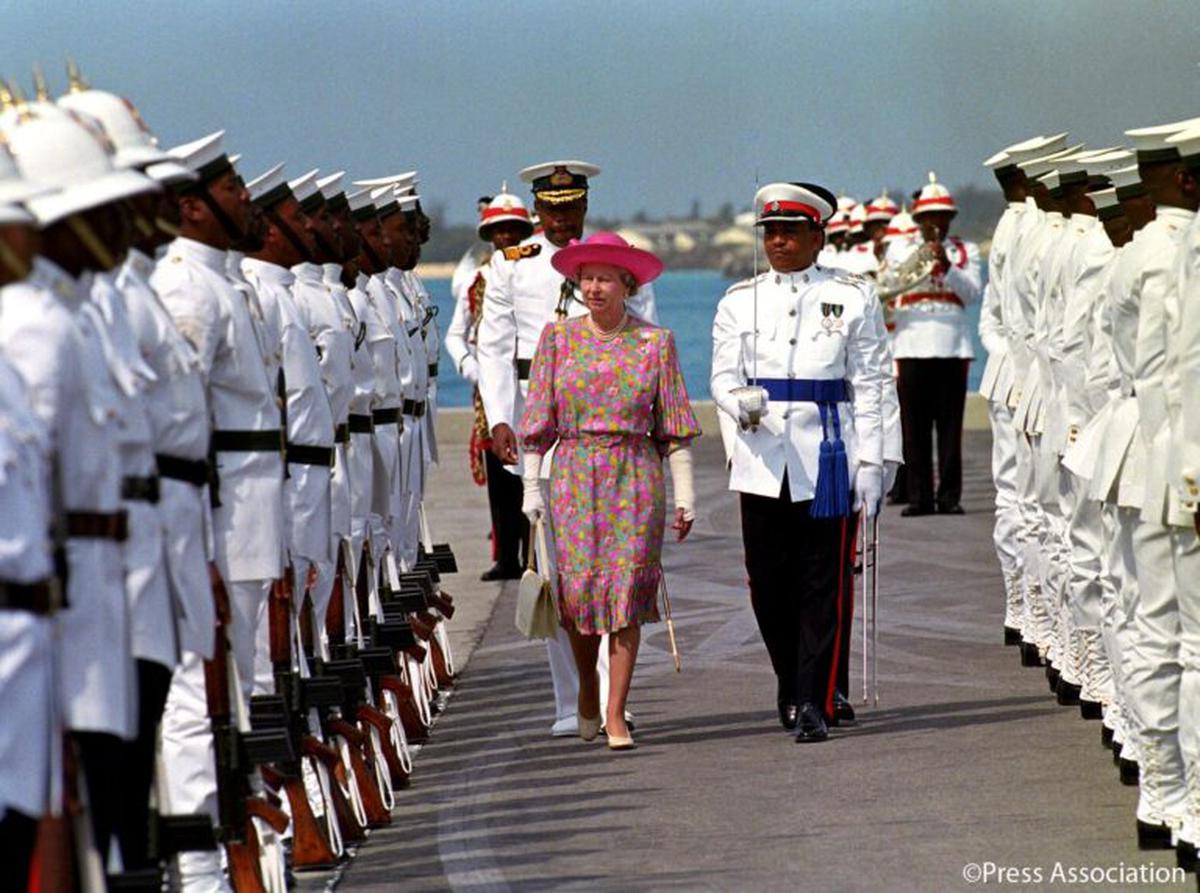
File photo: Queen Elizabeth II visiting Nassau, Bahamas in 1994
Other Caribbean island-nations
Four other Caribbean islands — Belize, Grenada, Jamaica, Saint Kitts and Nevis—were colonized by the British in 1862, 1877, 1866 and 1623 respectively. They were mainly colonized for slave labour and cultivating crops such as sugarcane, yams, plantains, cocoa, coffee, and cotton. Saint Kitts and Nevis was the first Caribbean colony of the British Empire in 1623, while Grenada was handed over to the British by the French in 1783.
Belize, known as British Honduras till 1973, achieved full independence on September 21, 1981, after months of negotiations with Great Britain and Guatemala over territory disputes. Grenada became independent in 1974, and Saint Kitts and Nevis in 1983. Jamaica — one of the world’s biggest slave markets established by Britain’s Royal African Company — cultivated much of Europe’s sugar, indigo, and cacao. Jamaica became independent in 1962.

People protest to demand an apology and slavery reparations during a visit to the former British colony by, Prince William and Kate, in Kingston, Jamaica, Tuesday, March 22, 2022
Two other Caribbean islands and former French colonies later handed over to the British are Saint Lucia (in 1814) & Saint Vincent and the Grenadines (in 1796). These were the last of the Caribbean colonies to gain independence in 1973.
After Barbados cut ties with the Queen, all six islands —Belize, Grenada, Jamaica, Saint Kitts and Nevis, Saint Lucia and Saint Vincent and the Grenadines— have sought to become republics. In 2022, visits from members of the royal family were met with protests from locals demanding reparations for slavery and an apology for colonization.
Tuvalu
Tuvalu, a group of eight islands in the South Pacific Ocean, was first colonized by the British as part of the Gilbert and Ellice Islands Colony in 1916 for slave labour. Amid racial tensions and secession demands from Ellice Islanders, the colony was split into two in 1976 and gained independence as Tuvalu in 1978. Two referendums were held in 1986 and 2008 on the question of whether the country should become a republic. Both failed, and the country remains a constitutional monarchy.
Canada
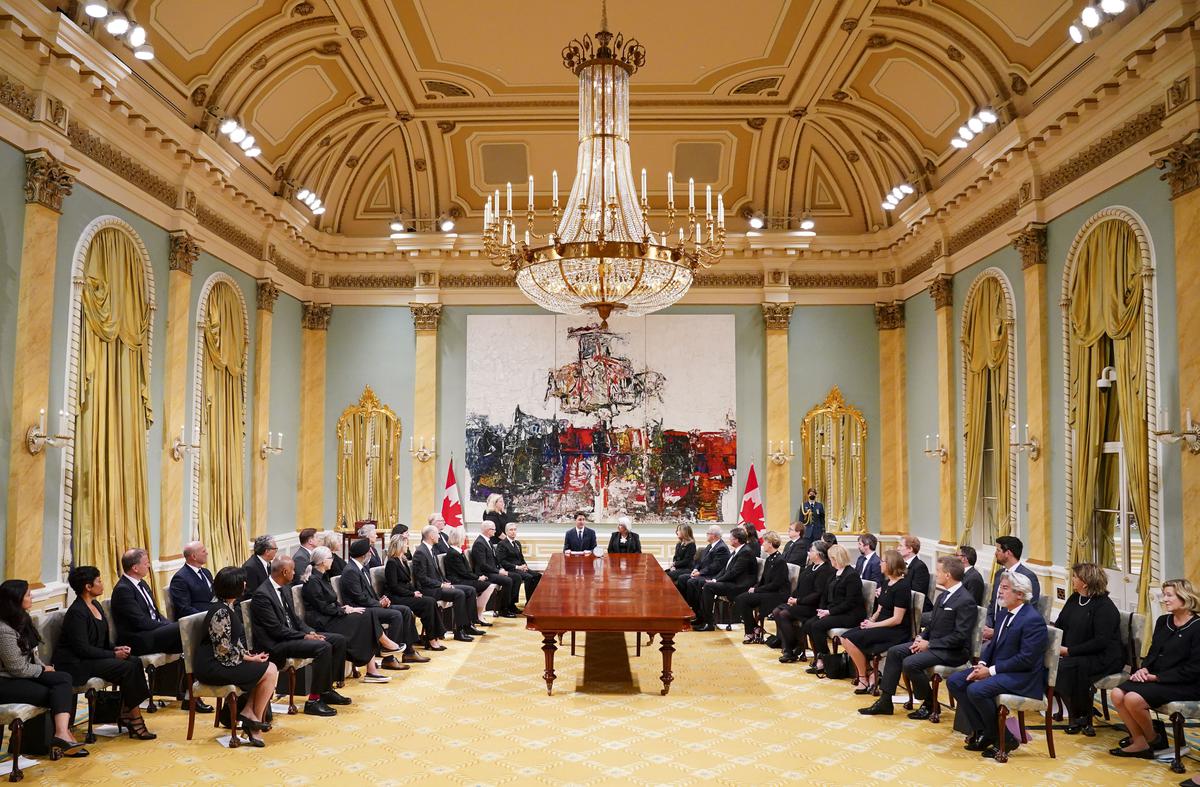
Canadian Prime Minister Justin Trudeau, Governor General Mary Simon and Cabinet members take part in a ceremony to proclaim the accession of the new Sovereign, King Charles III, at Rideau Hall, in Ottawa, Saturday, Sept. 10, 2022.
| Photo Credit:
Sean Kilpatrick
One of the British Empire’s largest colonies, Canada was colonised in the 1530s, with colonies set up in Newfoundland, Nova Scotia and Hudson Bay. . The French too set up colonies stretching from the Atlantic to the Hudson Bay, but lost them in the French and Indian War in 1763. As the British expanded their colonies, aboriginal Canadians were driven out. The Dominion of Canada was set up combining Canada, Nova Scotia and New Brunswick in 1867 — giving Canada self-governing powers under the Crown.
In 1931, Canada was put on equal footing with other Commonwealth countries, with full legal freedom; however, Britain retained the ability to amend the Canadian Constitution. It was in 1982 that Canada finally became a completely independent country, adopting its own Constitution.
The monarchy issue remains pending. In 2022, a parliamentary motion by Bloc Quebecois to cut ties with the British crown was voted down by Canada’s House of Commons by a 266-44 margin.
King Charles III may be set to lose yet another sovereign state under his rule – New Zealand – as Prime Minister Chris Hipkins said on May 1 that he favours his country becoming a republic. He, however, added that he does not intend for change right away.
Hours before leaving for London to attend King Charles III’s coronation, Mr. Hipkins told reporters, “Ideally, in time, New Zealand will become a fully independent country, will stand on our own two feet in the world, as we, by and large, do now”.
“I don’t think that swapping out the governor-general for some other form of head of state is necessarily an urgent priority right now, though,” he added.
New Zealand is a self-governing former British colony. However, Charles retains a largely ceremonial role as head of state and king and is represented in New Zealand by a governor-general. Like other former colonies, the debate over the constitutional role of the British monarchy in modern times is rife in New Zealand.
Apart from New Zealand, King Charles III is the monarch and head of state for fourteen sovereign countries, collectively known as the Commonwealth realms — Antigua and Barbuda, Australia, the Bahamas, Belize, Canada, Grenada, Jamaica, New Zealand, Papua New Guinea, Saint Kitts and Nevis, Saint Lucia, Saint Vincent and the Grenadines, the Solomon Islands, Tuvalu and the United Kingdom (UK).
In 2021, Barbados removed the then-Queen Elizabeth II as its head of state, becoming the newest republic in the world. It was the first to cut ties from the British monarchy since 1992, when Mauritius became a republic.
Follow the coronation updates here: King Charles III’s coronation ceremony live updates | King’s procession arrives at Westminster Abbey
What power does the King have over these nations?
As head of state, the King is represented by a Governor-General in these countries. In the name of the monarch, the Governor-General opens and dissolves parliament, commissions the Prime Minister, appoints other ministers after elections, gives assent to laws passed by Parliament and performs ceremonial duties as Commander-in-Chief of Armed Forces, such as attending parades.
File photo: Britain’s Queen Elizabeth II poses for a group photograph with Commonwealth leaders in Port-of-Spain, Trinidad, on November 27, 2009
| Photo Credit:
ANDRES LEIGHTON
Here’s a look at the current Commonwealth realms & their relationship with the Crown:
Antigua and Barbuda
Situated in the West Indies, at the juncture of the Atlantic Ocean and the Caribbean Sea, Antigua was colonized by the British in 1632 while Barbuda was colonized in 1678, primarily for slavery. The islands were decolonized in 1956 and joined the West Indies Federation. Antigua became self-governing in 1967, remaining dependent on the UK for external affairs and defence.
Amid calls for Independence in the 1970s in Antigua, Barbuda demanded secession from the larger island, voicing concerns about a stifled economy. However, autonomy talks were successful, and Antigua and Barbuda achieved independence on November 1, 1981. Shortly after, the country officially joined the United Nations and the Commonwealth —retaining the British monarch as its head of state.
On September 22, 2022, Reuters reported that the nation plans to hold a referendum about becoming a republic within the next three years. Following the death of Queen Elizabeth II, the country confirmed Charles III as its King, but Prime Minister Gaston Browne expressed a wish to ‘complete the circle of independence’ and become a republic.

File photo: Gaston Browne, prime minister of Antigua and Barbuda, speaks at the COP27 U.N. Climate Summit, on November 8, 2022, in Sharm el-Sheikh, Egypt.
| Photo Credit:
Peter Dejong
Australia, New Zealand & Papua New Guinea
The first British settlers arrived in Australia in 1788, establishing a penal colony in a land hitherto inhabited by over 500 aboriginal groups.
Strengthed by the arrival of the British Navy, the settlers waged several wars against the indigenous Maori population, eventually colonizing Australia, Tasmania, Papua New Guinea and New Zealand, which lost nearly 60% of their native inhabitants. As the settlers’ population grew, Australia was split into six colonies—over 80% white.
In 1901, Australia became a federation and the British monarch became the titular head of the state. Amid calls to become a republic, Australia held a referendum in 1999, which failed.
Recently, the Reserve Bank of Australia announced that King Charles III will not feature on Australia’s new five dollar note, opting to pay tribute to Indigenous Australians. While there are no urgent calls to alter the monarchy’s role, the government hopes to push for a referendum by 2025 if current Prime Minister Anthony Albanese wins a second term.
Similarly, New Zealand’s ex-Prime Minister Jacinda Ardern said that while the country would not actively push to become a republic, it eventually would. A New Zealand lobby group called Republic has set a goal of 2040 for a transition, hoping Australia’s referendum could speed up New Zealand’s process.
Australia and New Zealand’s neighbour, Papua New Guinea, too was colonised by the British in the 1880s following gold finds. Later, the island, dubbed New Guinea, was handed over to the Australian federation in 1906. Rich in cacao and Arabica coffee plantations, New Guinea remained under Australian administration till 1975. There have not been any strong calls for the removal of the King as titular head.

File photo: Then Australian Republican Movement chief Malcolm Turnbull during a referendum vote on becoming a republic in 1999.
| Photo Credit:
Rob Griffith
The Solomon Islands
Comprising six major countries and 900 smaller islands, the Solomon Islands are situated east of Papua New Guinea. These islands were exploited by the German and British armies for slave labour for plantations in Fiji and Queensland, Australia. By 1899, the Solomon Islands were under British rule and remained so till its independence on July 7, 1978. The debate for removing the Crown as its head has arisen post the death of Queen Elizabeth II.
The Bahamas
Another island in West Indies, the Bahamas was colonized by the British in 1666, with a plantation colony set up comprising the native Lucayans. However, the settlers soon lost interest in developing the islands and they turned into a pirate haven. In 1718, British troops were sent to tackle the pirate menace, and the island was captured by the US Navy in 1783, prompting an inflow of American migrants.
The island gained formal independence on January 7, 1964, with natives having control over internal affairs while the Governor-General looked after foreign affairs, defence, and internal security.
As economic conditions worsened in the Caribbean due to multiple devastating hurricanes and the global COVID-19 lockdown, the monarchy has not been a top concern.
However, since Barbados’ move to remove the Queen as head of state in 2021, other Caribbean islands too voiced their inclination to do so, demanding a formal apology from the monarchy for its role in slavery, colonization and the impoverishment of colonies.

File photo: Queen Elizabeth II visiting Nassau, Bahamas in 1994
Other Caribbean island-nations
Four other Caribbean islands — Belize, Grenada, Jamaica, Saint Kitts and Nevis—were colonized by the British in 1862, 1877, 1866 and 1623 respectively. They were mainly colonized for slave labour and cultivating crops such as sugarcane, yams, plantains, cocoa, coffee, and cotton. Saint Kitts and Nevis was the first Caribbean colony of the British Empire in 1623, while Grenada was handed over to the British by the French in 1783.
Belize, known as British Honduras till 1973, achieved full independence on September 21, 1981, after months of negotiations with Great Britain and Guatemala over territory disputes. Grenada became independent in 1974, and Saint Kitts and Nevis in 1983. Jamaica — one of the world’s biggest slave markets established by Britain’s Royal African Company — cultivated much of Europe’s sugar, indigo, and cacao. Jamaica became independent in 1962.

People protest to demand an apology and slavery reparations during a visit to the former British colony by, Prince William and Kate, in Kingston, Jamaica, Tuesday, March 22, 2022
Two other Caribbean islands and former French colonies later handed over to the British are Saint Lucia (in 1814) & Saint Vincent and the Grenadines (in 1796). These were the last of the Caribbean colonies to gain independence in 1973.
After Barbados cut ties with the Queen, all six islands —Belize, Grenada, Jamaica, Saint Kitts and Nevis, Saint Lucia and Saint Vincent and the Grenadines— have sought to become republics. In 2022, visits from members of the royal family were met with protests from locals demanding reparations for slavery and an apology for colonization.
Tuvalu
Tuvalu, a group of eight islands in the South Pacific Ocean, was first colonized by the British as part of the Gilbert and Ellice Islands Colony in 1916 for slave labour. Amid racial tensions and secession demands from Ellice Islanders, the colony was split into two in 1976 and gained independence as Tuvalu in 1978. Two referendums were held in 1986 and 2008 on the question of whether the country should become a republic. Both failed, and the country remains a constitutional monarchy.
Canada

Canadian Prime Minister Justin Trudeau, Governor General Mary Simon and Cabinet members take part in a ceremony to proclaim the accession of the new Sovereign, King Charles III, at Rideau Hall, in Ottawa, Saturday, Sept. 10, 2022.
| Photo Credit:
Sean Kilpatrick
One of the British Empire’s largest colonies, Canada was colonised in the 1530s, with colonies set up in Newfoundland, Nova Scotia and Hudson Bay. . The French too set up colonies stretching from the Atlantic to the Hudson Bay, but lost them in the French and Indian War in 1763. As the British expanded their colonies, aboriginal Canadians were driven out. The Dominion of Canada was set up combining Canada, Nova Scotia and New Brunswick in 1867 — giving Canada self-governing powers under the Crown.
In 1931, Canada was put on equal footing with other Commonwealth countries, with full legal freedom; however, Britain retained the ability to amend the Canadian Constitution. It was in 1982 that Canada finally became a completely independent country, adopting its own Constitution.
The monarchy issue remains pending. In 2022, a parliamentary motion by Bloc Quebecois to cut ties with the British crown was voted down by Canada’s House of Commons by a 266-44 margin.


